Grandpa Tom Tansey is turning out to be a good source of family stories, which is surprising because when he died his daughter found her mother busy tossing photos and papers into the incinerator Fortunately she was able to rescue many of them.
Tom had migrated from Snitterfield in Warwickshire to Australia in 1888 as a 16 year old and came to Geelong to live with his aunt who had migrated many years before and married. The next year he received the following letter.
Welcombe April 29 1889
Dear Sr
I was very glad to receive your letter of 19 March & find you were doing well.
Enclosed I send you a £5 note to help you on.
I send you a Stratford paper with an account of a Sham fight here on Easter Monday –
Things are rather better here than when you left, there is more work as prices seem better and generally speaking everybody is more cheerful.
I shall be glad to hear how you get on. I trust you will keep your health which is very important.
I am truly Rob N Philips
The family story is that Tom was promised that £5 note if he wrote to Squire Philips to let him know how he was getting on in Australia. But was he normally a good correspondent ? Again the family story tells us that after he was married it was his wife who was responsible for any correspondence with his mother.
Welcombe House was a country mansion near Snitterfield and Stratford upon Avon, built about 1835 by the Philips family. The Welcombe estate included the village of Snitterfield. It has some interesting associations. Robert Philips was grandfather of the historian G.M.Trevelyan, and a subsequent owner, Sir Archibald Flower, financed the original Shakespeare Memorial Theatre in Stratford on Avon. Welcombe is now a hotel.
But at the time of the letter Welcombe was owned by Robert Philips. He formally addresses Tom as “Sir”, to someone who had just had his seventeenth birthday. And he mentions sending a newspaper which reported on a “sham fight” at Welcombe on Easter Moday.
Now I promptly thought pugilists and fisticuffs but I was wrong. I couldn’t find the Stratford newspaper he mentioned but I found plenty of others reporting on these sham fights taking place around the country over Easter, the manouevres being practised by the various regiments. At Welcombe it was the 1st and 2nd Warwickshire Volunteers. You can read the reports in the transcripts from the LEAMINGTON SPA COURIER Saturday 27th April 1889 and the Coventry Herald Sham fight. They sound very like a setting for Midsomer Murders.
But it was this sham fight carried out at Welcombe which led me to the Worcester Cyclist Corps. 1889 .
When you stop and think of the times, the use of bikes for reconnoitering and passing on communications makes sense. Most photos you can find show bicycles, not tricycles, in use by the armies so I wonder how long the tricycle mentioned in 1889 lasted in use,
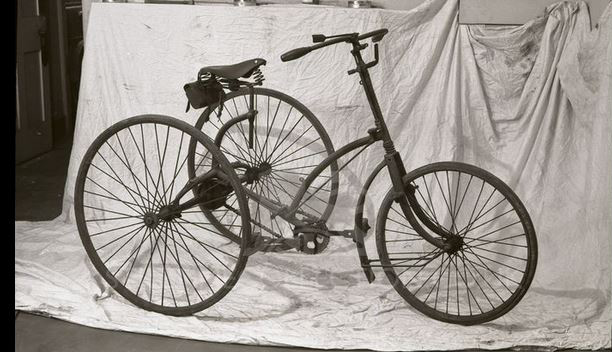
The Singer Tricycle in 1889 from the Stilltime Collection
This Singer is not to be confused with the Singer of sewing machine fame.
After the demonstration of military prowess suitably watched by the gentry there was the matter of some refreshments to be had.
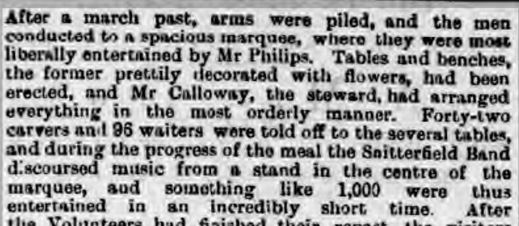 So the Snitterfield Band “discoursed music”. Tom had been a member of this band before he left for Australia. and perhaps he played for the Sham Fight at Welcombe the previous year or at one of the many other times the band played at Welcombe. R,N,Philips had given the village a full set of instruments in 1883 so they could form a Brass Band. Tom would have been 11 then. I wonder how old he was when he joined the band .
So the Snitterfield Band “discoursed music”. Tom had been a member of this band before he left for Australia. and perhaps he played for the Sham Fight at Welcombe the previous year or at one of the many other times the band played at Welcombe. R,N,Philips had given the village a full set of instruments in 1883 so they could form a Brass Band. Tom would have been 11 then. I wonder how old he was when he joined the band .
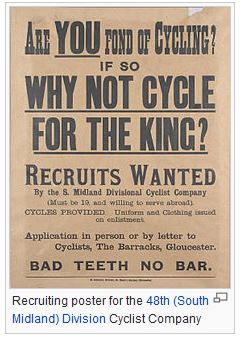 More letters can be found on this week’s Sepia Saturday
More letters can be found on this week’s Sepia Saturday

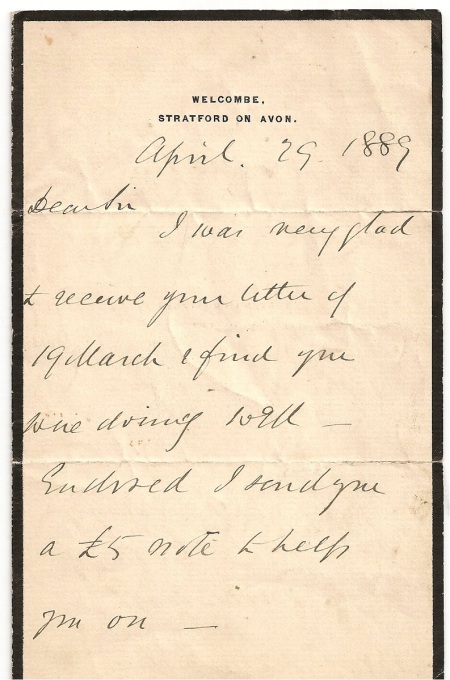
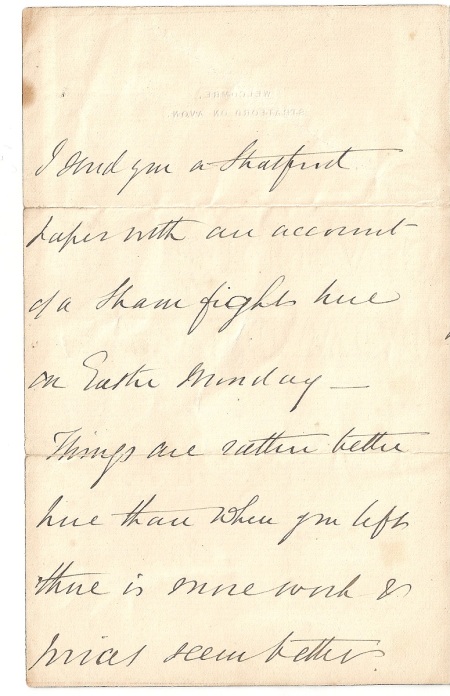
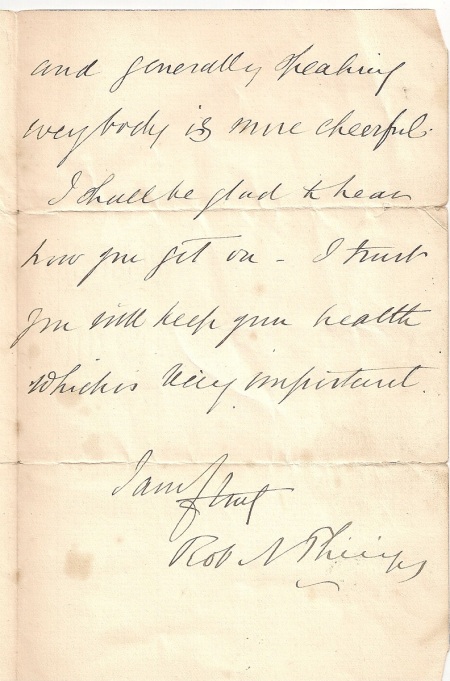
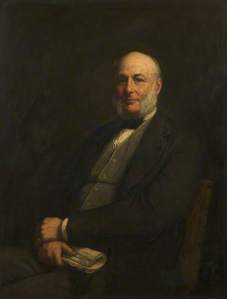
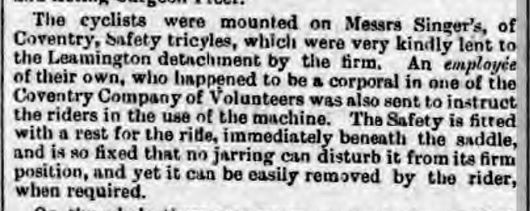
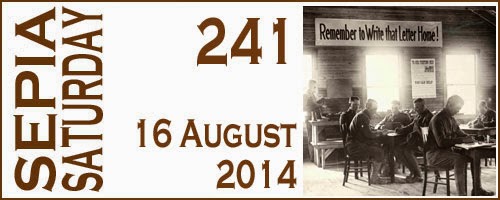
It seems like bicycles would not be suitable for actual fighting, though they could have other military uses.
LikeLike
What a fascinating account, thank you for sharing all this.
LikeLike
“Bad teeth no bar.” I wonder if they fixed them when you joined.
LikeLike
Kristin you beat me to it!
LikeLike
Isn’t it awful when relatives decid to destroy photos etc? My Grandma did the same I think as we cannot trace some pictures. It’s so sad.
LikeLike
“Cycle for the King” is a great tag line for the ad.
LikeLike
Someone recently posted a photo of a “tricycle” converted into an ambulance. For an emergency, I think a horse and wagon would have been faster. So if the army thought bikes and trikes were a good idea, they must have been.
And bless the aunt who stepped in to preserve whatever photos she could.
LikeLike
A very interesting letter. In my research on the background of an English musician from this same era, I discovered that young boys (or girls too) were often promised an honorarium if they returned to claim it after one year of taking an apprenticeship or position. They usually left home/school/orphanage at age 15/16 and this must have been an enticement to get a good reference. I suppose the tradition continues today with the gifts for high school graduates.
LikeLike
I rather like his, I am truly, and his name! Much nicer than truly yours, which often was not the case!
LikeLike
My daughter used to ride bikes all the time before her accident. In fact she rode for a cause from San Francisco to Los Angeles once, but her affected balance now keeps her from riding a two-wheeler any longer. We were fortunate to receive a 3-wheeled bike which she happily rode for a while, but our current home is located in a hilly area with very little smooth level places to ride which is a shame. Even with 3 wheels though, I find it hard to believe a gun could be mounted on one with any degree of stability while the bike is in motion and yet easily removed if needed – especially on the type of roads they must’ve ridden on back then?
LikeLike
One relative told me that they found a box of old photos in the chook shed when their parents died and only salvaged a few. Why would you store photos in a chook shed??????
Glad you transcribed the letter as I am terrible at recognising and reading old writing.
Thank you
LikeLike
Sorry that was me above. I hit “Post Comment” before I put my details in!
LikeLike
Letter writing bribery! Too funny, it did appear to work though.
LikeLike
You must be very grateful to Grandpa Tom Tansey’s daughter! I have a question for Sharon–what is a “chook shed”?
LikeLike
I just googled “chook shed”. It’s a chicken coop! sort of. 🙂
LikeLike
It’s lovely to see the interest in “chooks” which, for the uninitiated is our Australian slang for a hen, chicken or rooster, and a chook shed is a safe place to lock up the chooks at night and to provide somewhere for them to lay their eggs. And of course you can always refer to an old lady as an old chook, but that’s not very flattering !!
LikeLike
Five pounds was a lot of money in 1889! Very generous. Tom obviously appreciated it because he kept the letter. What a treasure. (And excellent research B.)
LikeLike